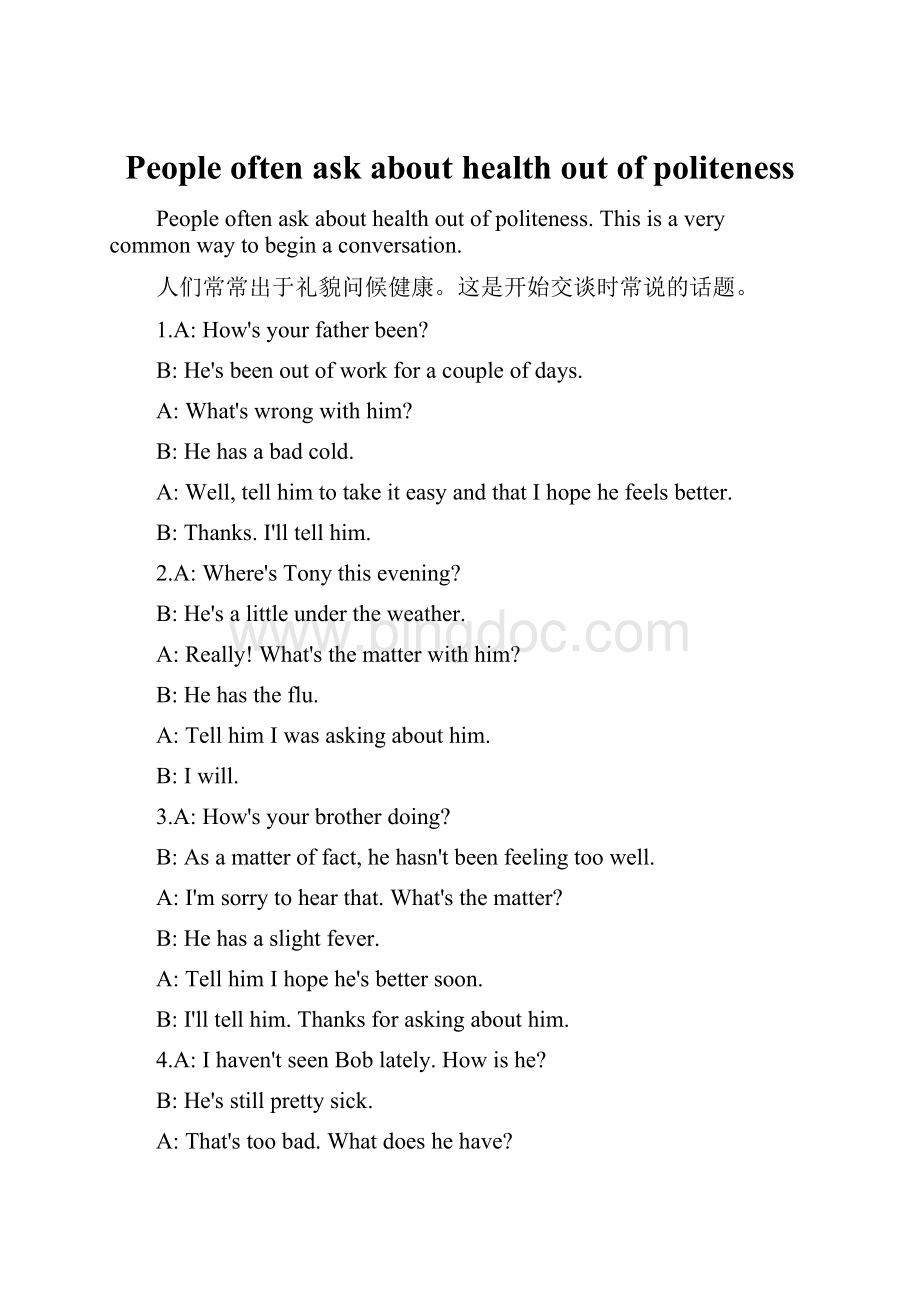People often ask about health out of politeness.docx
《People often ask about health out of politeness.docx》由会员分享,可在线阅读,更多相关《People often ask about health out of politeness.docx(14页珍藏版)》请在冰点文库上搜索。

Peopleoftenaskabouthealthoutofpoliteness
Peopleoftenaskabouthealthoutofpoliteness.Thisisaverycommonwaytobeginaconversation.
人们常常出于礼貌问候健康。
这是开始交谈时常说的话题。
1.A:
How'syourfatherbeen?
B:
He'sbeenoutofworkforacoupleofdays.
A:
What'swrongwithhim?
B:
Hehasabadcold.
A:
Well,tellhimtotakeiteasyandthatIhopehefeelsbetter.
B:
Thanks.I'lltellhim.
2.A:
Where'sTonythisevening?
B:
He'salittleundertheweather.
A:
Really!
What'sthematterwithhim?
B:
Hehastheflu.
A:
TellhimIwasaskingabouthim.
B:
Iwill.
3.A:
How'syourbrotherdoing?
B:
Asamatteroffact,hehasn'tbeenfeelingtoowell.
A:
I'msorrytohearthat.What'sthematter?
B:
Hehasaslightfever.
A:
TellhimIhopehe'sbettersoon.
B:
I'lltellhim.Thanksforaskingabouthim.
4.A:
Ihaven'tseenBoblately.Howishe?
B:
He'sstillprettysick.
A:
That'stoobad.Whatdoeshehave?
B:
Wedon'tknow,buthe'sgoingtothedoctortomorrow.
A:
Letmeknowifthere'sanythingIcando.
B:
Thanksalot.I'lltellhim.
ADegreeinLuxuryisBeingLaunched攻读奢侈品牌的学位刚刚推出
收听与下载
∙
o下载音频
o下载练习题
Inaso-calledageofausterityyoumightnotexpectauniversitytobeofferingadegreeinluxury.
However,thisautumntheInternationalUniversityofMonacoislaunchingamaster'sdegreeinluxuryretailmanagement.
Thedegreeisafarcryfromthestudentstereotypeofdebtanddingyflats,andwillfollowasyllabuslookingatdesignerproducts,privatejetsandyachts.
ThecoursehasbeendevelopedincollaborationwithdesignerbrandssuchasGucciandRalphLauren.The35studentswilllearnabouthowtoselllavishgoodsandrunluxuryboutiques.
DespiteEurope'scurrentfinancialtroubles,theuniversitysaysthecoursehasbeendevelopedinresponsetoademandforstaffwhospecialiseintheluxurymarket.
Harrodsisoneoftheworld'slargestdepartmentstores
Aspokeswomanfortheuniversitysays,"Gonearethedayswhenitwaseasytosellluxurygoodsbasedontheallureofthebrandalone."Theuniversityalsosaysthatthecoursewillteachstudentshowtoofferpeopleanexceptionalshoppingexperience"inwhichconsumersdeveloplong-lastingandemotionaltieswiththebrand".
However,beforeyoustartapplyingtolivethehighlifeitisimportanttopointoutthatstudentswillbelearningabout,ratherthanenjoying,theworldofopulentbrands.
Thedegreeisinacountryassociatedwithwealthandextravagance,buttheInternationalUniversityofMonacoisnotthefirsttoofferadegreeinluxuryretail.
High-endLondondepartmentstoreHarrods,knownforitsdesignerproducts,announcedearlierthisyearthatitwouldbeofferinganundergraduatedegreeinretailingforitsownstaff.ThefamousLondonstorebelievesitwillreaptherewardsfromauniversitytrainingprogramme.
SothatisoneHarrodsproductthattouristswon'tbeabletotakehome-auniversitydegree.
Glossary词汇表(收听发音,请单击英语(论坛)单词)
∙so-called所谓的
∙ageofausterity简朴的年代
∙farcry相差甚远
∙stereotype模式化的形象
∙dingy肮脏的
∙syllabus教学大纲
∙yachts游艇
∙incollaborationwith与…合作
∙brands品牌
∙lavish奢侈的,昂贵的
∙run经营
∙specialise专攻
∙gonearethedays…日子一去不返
∙allure诱惑力,吸引力
∙emotionalties感情上的纽带
∙livethehighlife过着奢侈豪华的生活
∙opulent豪华的
∙extravagance奢侈,挥霍
∙high-end高档
∙reaptherewards收获成果
LosingthePlot俚语:
疯了
http:
//edu.QQ.com 2010年08月12日17:
44 BBC英伦网 我要评论(5)
Thescriptofthisprogramme本节目台词
收听与下载
∙
o下载音频
o下载文字稿
William:
HelloandwelcometoRealAuthenticEnglishfromtheBBC.I'mWilliam.
Feifei:
Er...Will?
Youmean,AuthenticRealEnglish?
William:
Uh-huh.
Feifei:
Yousaid"RealAuthenticEnglish".
William:
DidI?
!
Gosh.I'dbetterdoitagain.
HelloandwelcometoAuthenticRealEnglishfromtheBCB.I'mWilliam.
Feifei:
Eh!
?
BCB–what'sthat?
BritainChinaBroadcasting?
!
William:
Whatiswrongwithmetoday?
!
Iobviouslyhaven'thadmycoffee.I'lldoitagain.
HelloandwelcometoAuthenticRealEnglishfromtheBBC.I'mFeifei.
Everfeelyou'relosingtheplot?
Feifei:
What?
!
William:
Sorrysorrysorrysorry!
I'mlosingtheplothere!
Feifei:
Eh?
Losingtheplot.忘记了故事情节?
什么故事情节?
William:
I'mlosingtheplot.Ifsomeoneisgoingcrazywecansaythatthey'relosingtheplot.
Feifei:
这是一个俚语表达,意思就是某人快要疯了。
那这个表达是不是挺不礼貌的William?
William:
Itcanberude,butitdependsonhowit'sused.Solet'slistentoanexamplewhereitisbeingusedinaslightlyrudeway.
Man:
Ican'tbelievethebossisblamingmeforthis!
Iwasn'tevenworkingonthatproject!
Woman:
That'stypicalofher.Shelosttheplotyearsago,thatwoman.
Feifei:
英语(论坛)里losingmymind这个表达的意思是失去理智,快要疯了。
这个表达和losingtheplot意思是一样的吗?
William:
Yes,Ithinkitdoesmeanthesame.Wecanalsosay"She'slostherwits"or"She'slosthermarbles".
Feifei:
She'slosthermarbles?
!
她丢了她的玻璃弹子。
William:
Wecanevenjustsay"He'slosingit".
Man:
Ireally,reallyneedaholiday.IthinkI'mindangeroflosingitunlessIhaveabreaksoon.
Feifei:
I'mindangeroflosingit.意思就是如果我再不注意的话,就要疯了。
William:
Yes,butbecarefulwiththatphrase'I'mlosingit'or'She'slostit'becausetoloseitwithsomeonemeanstogetveryangrywiththem.
Feifei:
Sohelostitwithme的意思就是他冲我发火儿。
英语里有很多意思相近的短语,看起来都大同小异。
我觉得哪天我肯定会在一个重要的场合用错一个短语,搞出一个大笑话,毁了我美好光明的前程!
你说这一切都是为了什么?
!
William:
Areyoulosingtheplot,Feifei?
Feifei:
IbelieveImightbe!
Remembertocheckoutour...Remembertocheckoutourwebsite...I'velostit!
William:
CheckourwebsiteformoreAuthenticRealEnglish.Byefornow.
Feifei:
Bye!
解读GRE阅读中最常用的四种逻辑思维
2010年08月09日11:
18苏州新东方学校李雪松我要评论
(2)
字号:
T|T
GRE(GraduateRecordExamination)考试一直被考生们奉为英语(论坛)考试中的GodReadEnglish,被广大考生视作出国道路中最大的障碍。
不可否认,GRE考试确实有一定难度,并不像有些同学主观认为的那样,听听课就可以顺利通过的。
原因很简单,GRE是美国、加拿大的大学各类研究生(论坛)院(除管理类学院,法学院)要求申请者所必须具备的一个考试成绩,也是教授对申请者是否授予奖学金所依据的最重要的标准。
简单的说,GRE考试是测试考生是否具有研究生思维的考试,是决定老外是否给你钱的考试,就算简单又能简单到哪去呢?
所以在我讲各种逻辑思维之前,首先想声明,如果作为考生的你,每次做GRE阅读练习的时候,文章都读得懂,但是题目老是错,那在我如下写的文章中,你一定可以找到想要的。
但对于某些单词还未背过的考生,对文章完全不知所云的考生,就指望看了这篇文章后就成为“东方不败”的,我建议还是现实点,从基础抓起。
天上不会无缘无故掉馅饼,就算真的某天掉了,不早点起来去抢,也是白搭。
技巧永远是建立在实力之上的。
有很多考生已经很艰辛地完成了背单词方面的工作,建立了较好的基础,对于GRE阅读中的文章,也能够读懂一二了,可做起题来,一选就错,一对答案就恍然大悟,再做题,还错。
可以说身心的摧残已经到了极限。
这时候就要停下来思索一下了,问题究竟出在哪呢?
在逻辑思维。
举个简单的例子,大家记得在中小学学语文的时候,老师在讲每篇文章前的第一件事就是介绍文章的写作背景,然后让同学们结合背景努力地去在文章的字里行间里挖掘深邃的含义。
这就让学生们潜意识的形成了一种思维——我所看到的一定不是我所看到的,一定有什么我看不到的深刻含义,于是结合自己的背景知识深挖细究,把很多文中没有的信息都挖出来。
这种思维在解决语文考试时固然有效,但是现在考生们要面对的是GRE考试,是一门不同于中国文化的外语考试。
需要对大家的思想进行重塑,以往天马行空的幻想式阅读方式是绝对不适合GRE阅读的。
下面就和各位考生一起分享一下,在GRE阅读中,几种大家需要注意的常见逻辑思维。
1.文中没说的不要选
有同学看到这第一个思维就在笑,这谁都知道,干嘛还要强调呢?
我把这个思维放在第一个讲,是因为这是考生们最容易犯的错误,也是GRE考试阅读中最重要的一个思想。
举个很简单的例子:
问大家上面两个图形是什么图形,大家都会无奈地笑笑后说,圆形和三角形。
在大家无奈的笑后,我也只能无奈的笑笑,答案错了。
因为根据三角形的定义,是三条线段围成的一个封闭图形,但是上面的图形并不封闭。
同理,“圆”那个图形也并不是圆。
这就是考生们经常犯的错误,总会主观地根据自己的知识,把一些文中不存在的东西给填补上,然后得出一个看似有理,实则荒谬的答案。
所以请各位考生在下笔选之前,首先问自己这个原文到底说了没有,三思而后选。
2.“取非”思想
这个思想很简单,但是很有用。
大家从高中开始就学习英语语法中的虚拟语气,但是大多数人学会的仅仅是虚拟语气中的一些规则,估计现在还忘了,这个只是只明其表,不明其理。
在GRE阅读中,虚拟语气就有一种很有用的含义,那就是——见到虚拟语气就要想到“取非”。
比如作者如果写到:
“如果我能够把韦氏字典都背完,那我GRE阅读肯定没有问题了。
”这句话其实想要表达的问题就是“我的GRE阅读有问题”。
下面我们来分析下,如何用取非的思想处理GRE阅读考试中的虚拟语气。
(1)若在文章中看到虚拟语气,考虑直接取非反义理解,迅速把握作者态度。
如下面这句话:
例一:
Perhaps,somescientiststhought,migrantsdeterminetheirgeographicpositiononEarthbycelestialnavigation,almostashumannavigatorsusestarsandplanets,butthiswoulddemandoftheanimalsafantasticmapsense.(选自N0.6题第一套section1短文章)
这句话看似很长,翻译成为中文的意思是:
“有些科学家认为,就像人类采用恒星和行星来定位一样,候鸟或许也是采用天体的导航才得以确定它们所处的地理位置,但这要求这类动物具有令人难以置信的地图感。
”中文读过去都让人头疼。
其实我们用虚拟语气取非的思想来处理,其要表达的意思就很简单,对前半句话取非,说白了就是前半句话是行不通的,也就是“migrantscannotdeterminetheirgeographicpositiononEarthbycelestialnavigation.”可以知道作者对这种解释持负评价。
我们再来看个例子:
例二:
Accordingtonaturalselectiontheory,aworkerwouldenhanceherfitness—orabilitytopropagatehergenes—byhatchingherowneggsinadditiontoorinplaceofthequeen’s.(选自国内题1993年10月考题section5短文章)
这句话也是虚拟语气,我们直接取反理解,作者想要表达的就是“aworkerwillnotenhanceher…”
运用这种取非的思想我们可以迅速的把握作者的态度,以及作者想要表达的真实意思。
就不用先翻译成绕口的中文,再拼命的思索其中的含义,可以有效地为考试争取时间。
(2)在题干中看到虚拟语气,大多需要用到取非思想,与之相对应的一种题型是GRE阅读题中常见的一种,叫做“改进型取非题”。
看例子之前,先简单解释下什么是“改进型取非题”。
很简单,如果题干问“如果一个对象怎样会更好”则是改进型取非题,来看具体的例子:
例:
Itcanbeinferredfromthepassagethatthe“firsttheories”ofgrazercontrolmentionedinline3wouldhavebeenmoreconvincingifresearchershadbeenableto(选自NO.6第二套section1长文章),这是一个典型的改进型取非题题干,问的是第三行第一个理论怎样会更好。
逻辑思路:
既然是改进,原文肯定说到了它的不好之处或者有unless的句子,我们把造成不好的原因取非,就是所要的答案了。
按照此思路定位原文三行,看到后面有这样一句话“Alownumberofalgalcellsinthepresenceofahighnumberofgrazerssuggested,butdidnotprove,thatthegrazershadremovedmostofthealgae.”注意看插入语部分的“butdidnotprove”,这个就是缺点,取非就是“prove”再看五个选项:
(A)observehighphytoplanktonnumbersundernaturallakeconditions
(B)discovernegativecorrelationsbetweenalgaeandzooplanktonnumbersfromtheirfieldresearch
(C)understandthecentralimportanceofenvironmentalfactorsincontrollingthegrowthratesofphytoplankton
(D)makeverifiablecorrelationsofcauseandeffectbetweenzooplanktonandphytoplanktonnumbers
(E)inventlaboratorytechniquesthatwouldhaveallowedthemtobypasstheirfieldresearchconcerninggrazercontrol
一眼扫过去就只有一个选项在讲证明,就是D中的verifiable。
所以答案选D。
很快解完此题。
(3)取非的思路除了可以在虚拟语气中使用,还可以在另一种逻辑关系中使用,就是强对比的关系,也就是GRE阅读题中另一种常考题型“强对比互取非题”,其主要特点是:
原文中有强对比的双方,题干只问及其中一方,答案是对另一方叙述的取非;或者题干和原文存在强对比要素,如典型的时间要素,答案也是对原文的叙述取非。
来看个简单的例子,
例:
Theauthorsuggeststhat,beforetheearly1950’s,mosthistorianswhostudiedpreindustrialEuropedidwhichofthefollowing?
(选自NO.6第三套section4长文章)
思路:
在题干中看到了1950’s,第一反应就是要回原文定位,发现原文只讲到了”intheearly1950’s”并没有”before”,这显然就是时间上一个取非的关系,我们把intheearly1950’s干的事情取个非,就是之前干的事情。
答案就很好选了,在此不举出来了。
这个思路很好理解,比如说“我1995年第一次去北京。
”很显然,1995年以前我就没有去过北京。
这就是时间状语的取非。
其它的强对比关系(如处于相对低于空间的事物通常其特点呈强对比;新事物、新观点和旧事物、传统观点呈强对比;用最高级、唯一性限定的事物和其余所有同类事物的特征呈强对比等),相信考生可以一眼看出,在此就不在一一列举